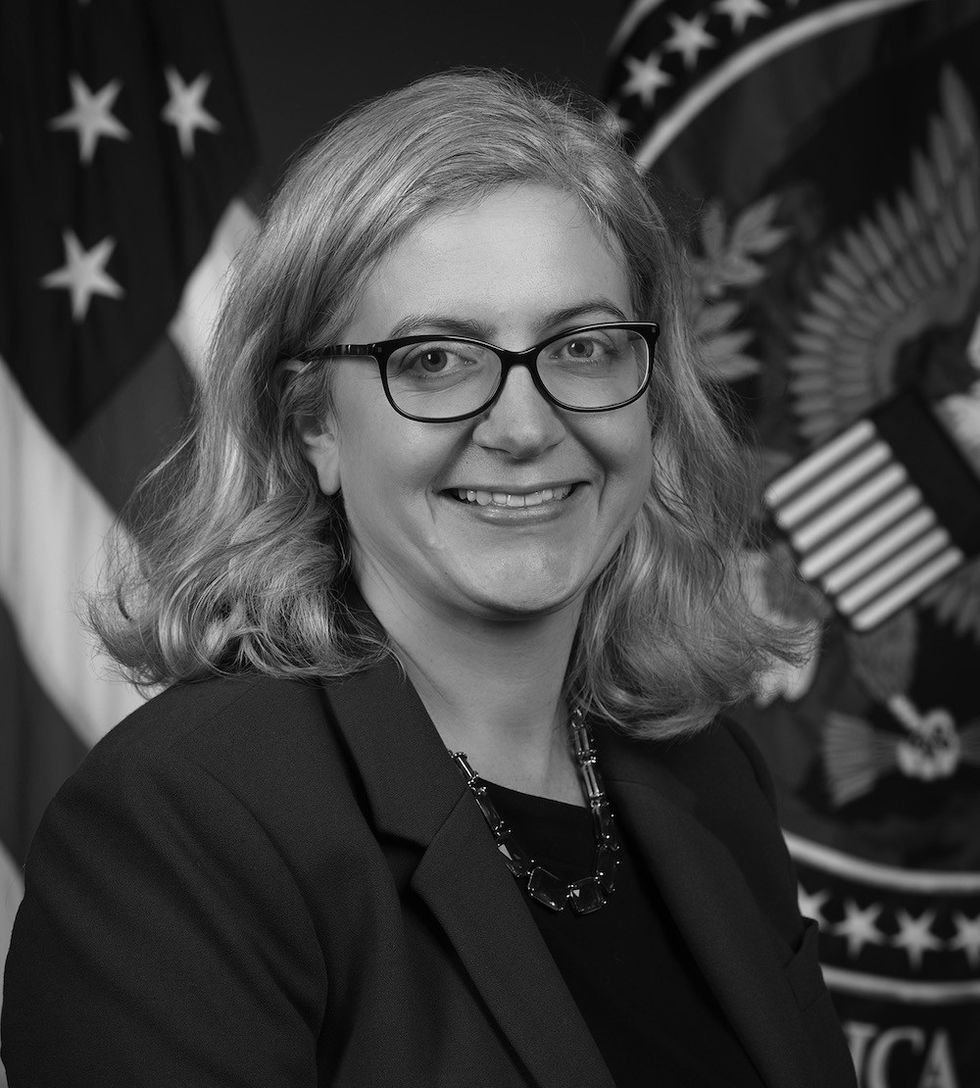Kristin Wood, Sr. Climate Editor, The Cipher Brief
Kristin Wood is the Senior Climate Editor for The Cipher Brief, a Cipher Brief expert, a non-resident fellow at the Harvard Kennedy School’s Belfer Center for Science and International Affairs’ Intelligence Project, and a former senior CIA officer with 20 years of experience in analysis, operations, and innovation and technology.
Erin Sikorsky, Deputy Director, Center for Climate and Security

Erin Sikorsky is the Deputy Director of the Center for Climate and Security (CCS), the Director of the International Military Council on Climate and Security(IMCCS), and an adjunct professor at George Mason University’s Schar School of Policy & Government. Previously, she served as the Deputy Director of the Strategic Futures Group on the US National Intelligence Council (NIC). Ms. Sikorsky worked in the US intelligence community for over a decade.
EXPERT PERSPECTIVE — President Biden’s 27 January Executive Order (EO) on Tackling the Climate Crisis at Home and Abroad demonstrates a strong commitment to preparing the United States for addressing the climate crisis. It assigns experienced climate experts into powerful new roles and issues extensive orders for a whole-of-government response. This article analyzes the Intelligence Community aspects of the EO.
For national security agencies, the EO orders agencies to assess within 90 days:
— Climate impacts relevant to broad agency strategies in particular countries or regions;
— Climate impacts on their agency-managed infrastructure abroad (e.g., embassies, military installations), without prejudice to existing requirements regarding assessment of such infrastructure;
— How the agency intends to manage such impacts or incorporate risk mitigation into its installation master plans; and
— How the agency’s international work, including partner engagement, can contribute to addressing the climate crisis.
Fully maximizing the effectiveness of the 18 IC agencies’ individual responses to the EO will require a coordinated strategy. While the EO calls for a National Intelligence Estimate on climate change, representing coordinated analysis among all agencies is only one piece of the puzzle.
Building a true climate security intelligence strategy will require an evaluation of how the IC’s core missions of collection and analysis can contribute to addressing climate threats. This will require an assessment of the IC’s people, programs and policies as well as what is missing, what needs to be adjusted, and what new skills, capabilities and resources are required.
The overriding question for collection and analysis is: what decision advantage can the IC offer the President when it comes to climate issues? What unique climate change-related information can the intelligence community collect and analyze that would serve US national security? Are there new forms of collection and analysis, especially scientific analysis needed? How could the CIA’s unique capabilities, for example, be brought to bear? A rigorous process aimed at answering these questions should examine what new requirements need to be levied, what new sources HUMINT, SIGINT, and other collectors need to find, and what partnerships need to be deepened or created.
To conduct this evaluation, we suggest creating an ODNI National Security and Climate Change Task Force that looks at each agency’s contributions to the EO and stitches them into a whole-of-IC approach to climate across all missions. A blue-ribbon panel of climate and security experts from both outside and inside government would offer a fresh perspective on how the IC could best contribute to tackling this mission. In addition to offering expertise that mostly resides outside the IC, external participants would be a check on agencies’ tendencies, which we’ve experienced multiple times over the decades, to relabel existing entities with a new name as an answer to executive requirements.
Such a task force is likely to identify necessary adjustments to IC spending, personnel, and infrastructure. Additional leadership positions or new structures within agencies may be needed to implement task force recommendations in the longer term. For example, better integration of climate modeling and data, open-source collection, and classified information may require new tools and new teams to fully implement. On top of adjustments to collection and analysis, the IC also must consider direct climate change risks to its facilities and infrastructure. Therefore, the task force should include an IC Climate Resilience and Adaptation Subcommittee with finance, facilities and security expertise.
We offer below some issues such a task force could consider, drawn from engagements with hundreds of experts on climate security issues over the past few years:
- IC strategic foresight and early warning capabilities and talent have been diminished over time by other priorities. They are very much needed to support threat anticipation and preparedness on a range of intersecting risks linked to climate change, from water and food insecurity, regional conflicts, infectious diseases, and natural disasters. Global trends work — often relegated to the physical and metaphorical basement — needs to be front and center. The Biden Administration has already signaled its prioritization of a more integrated approach to monitoring global threats by its call for the creation of a National Center for Epidemic Forecasting and Outbreak Analytics to modernize global early warning and trigger systems to prevent, detect, and respond to biological threats. The types of contributions the IC would make to such a center could and should be replicated in the climate security realm.
- Climate security risks also create opportunities to use the CIA’s unique overseas partnerships in new ways. CIA stations and bases would be ideal leadership nodes for partnering on climate change, allowing the Agency to tap into existing liaison relationships to generate projections that no one else could. The CIA could play a critical role in helping US policymakers understand other countries’ plans and intentions to respond to climate security threats. Additionally, climate change could be an area of partnership with countries such as Russia and China.
- While conducting climate science within the US government will remain the purview of scientific agencies such as NOAA, NASA, and others, IC agencies need more personnel with scientific literacy and backgrounds. At a minimum, agencies will need more climate scientists on their teams and closer partnerships with them so that deep scientific understanding is included in collection requirements and analytic writing.
Finally, we note the National Climate Task Force created by the EO does not include the DNI as a member. While that seems a logical choice as the task force is focused domestically, the reality is that the division between foreign and domestic operations just doesn’t work for climate. For example, the IC can answer foreign policy and homeland security questions on topics such as prospects for climate-expanded migration to US borders, actual versus publicly provided achievement of other countries’ climate objectives, among many other things. The IC can also leverage its unique capabilities to understand how other actors are responding to climate change effects—i.e., not just what will they do in emissions negotiations, but explain how issues such as water scarcity concerns drive Chinese foreign policy in the region.
As President Biden said when signing the climate executive order last month, his action made “it official that climate change will be the center of our national security and foreign policy.” The security threats posed by climate change grow with each passing day and addressing them requires innovation and new conceptions of national security. As it has so many times before, on many different threats, the IC can and should step up to play a leading, transformative role on climate security risks, integrating across missions to deliver the most insightful analysis possible in support of the President’s directive and in service to the American people.
Read more expert-driven national security analysis, perspective and opinion in The Cipher Brief
















